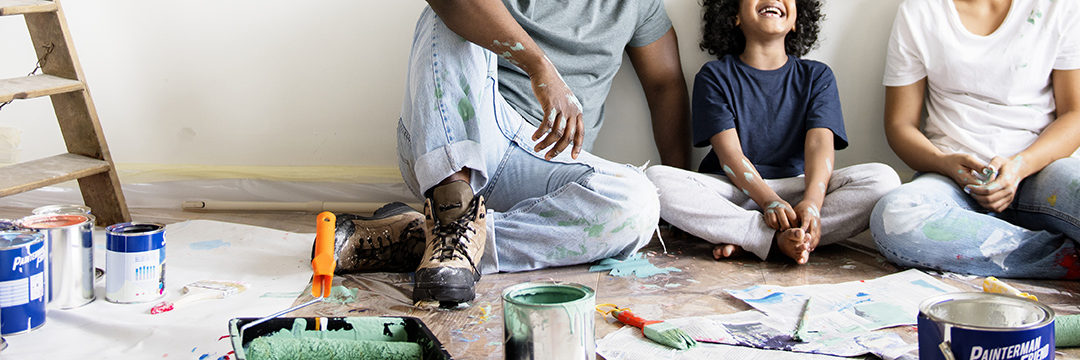Guidelines to Get Started: When to Paint, How to Prep, and the Supplies You Need
By Jimmy Cordier, Owner, Pinon Painting
Most people wait too long to paint their home because it’s an expensive endeavor, and even more, a pain in the butt if you’re doing it yourself. Painting your home is a major undertaking and a big decision that requires a good deal of consideration.
Guidelines to get started
If you’re thinking about tackling this project yourself, consider the work involved, the time it’s going to take, and which tools and sundries are necessary to complete the job.
- Let’s start with tools and sundries. This isn’t an all-inclusive list, but here are some of the items you’ll need: extension ladders, step ladders, brushes, roller frames, roller covers, roller trays, extension poles, paint sprayer (if you are spraying), pressure washer, caulking gun, caulk, screwdrivers, pliers, stir sticks, sanders, grinders, putty knife, drop cloths, plastic sheeting, tape, plastic or paper film, masker, dust masks, and extension cords. Pro tip: it costs more than $10,000 to stock one of our Pinon Painting trailers to handle an average paint job.
- Next, plan for enough time to do the job. For the team at Pinon Painting, the average exterior job can take 80 to 120 hours for a two-coat job. As a homeowner without professional experience, allow for 50 to 100% more time. Certainly, painting the exterior of a home can take many weekends or most of your vacation time if you are still working full-time. Pro tip: consider painting one side at a time and spreading the job out. Also, consider painting only the sides or areas that need painting. The north and east sides of some homes are protected enough they don’t need to be touched up as frequently as the south and west sides.
- Choose your colors and pick up the paint. Pro tip: order less paint than the paint store recommends—figure on 15 to 20 percent less than the store calls for. They arrive at their numbers by a general spread rate. None of this paint will be returnable unless your home is pure white, and you can always buy additional paint.
- Prepare, prepare, prepare! The most important aspect of the job is preparation. Everyone has heard this over and over, and that’s because it’s true. When it comes to a two-coat job for Pinon Painting, we typically apply paint for only 25 to 35 hours of the project. That’s right: less than half the time we spend. The rest of those hours are invested in preparation. Pro tip: invest plenty of time in scraping and feather sanding the peeling edges; your job will last longer.
- Next, mask your surfaces. Before you start painting, make sure everything you don’t want to be painted is covered and protected. For me, this is the most boring part of the job. Pro tip: make your masking great! if you don’t, you will be doing my least favorite part of the job: cleaning up mistakes. It is always quicker to do the job right the first time. Correcting mistakes can easily take 3-4 times longer than what was originally intended.
- The second most important thing for the longevity of your paint jobs is the proper primer. Pro tip: you only need a primer-specific product for raw wood, severely dried out wood or if you are painting over semi-transparent stains. The old oil-based primers are still best, but no one really carries them locally. Also, the EPA has forced changes in these products so I would not recommend them. Water-based primers and quick-dry primers like Kilz don’t work very well either. They dry too quickly to penetrate the wood, especially in our climate. Also, at Pinon Painting, we use a primer I’ve been using for nearly two decades, and we include an oil additive to fortify it and slow down the drying time. Call the office and we will give you the details.
When to paint
First, I always recommend painting your home before it peels, if possible. To that end, the first sign that it is time to paint your home is when it is faded. Faded paint is porous and allows water and moisture vapor to infiltrate the substrate. Water is the cause of 99 percent of all paint failure.
Of course, you can always paint your home just because you want to change the color too.
When choosing your paint, I would recommend you buy from Sherwin-Williams or Dunn-Edwards Paints. That way if you do have an issue with the paint, you can speak to someone locally. Home Depot or Lowes will probably pass you off to a regional representative if you have a paint problem, and it may take weeks or longer for them to head up to our area.
I would also look only at lifetime rated paints. Of course, they won’t actually last a lifetime. That designation simply means it is a much more durable, longer-lasting product than others on the market. And, the paint store is just expecting you to move away before testing that claim, which, by the way, is based on the national average: 5.7 years.
Good luck on your home project!
Visit Pinon Painting at 1032 E. Fair Street in Prescott. For more information or a free estimate, call 928.776.2902.

